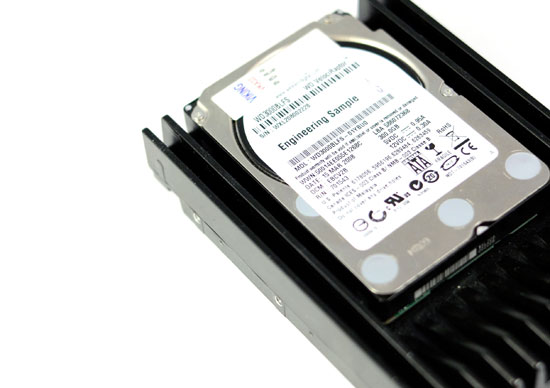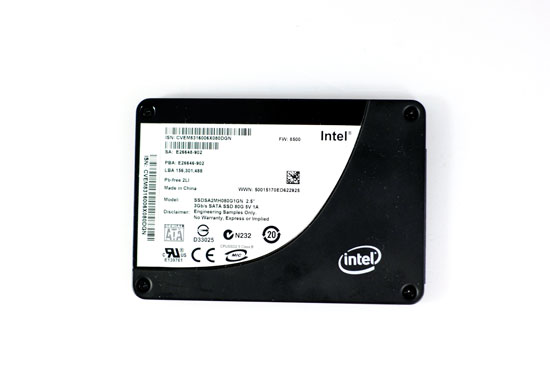The SSD Anthology: Understanding SSDs and New Drives from OCZ
by Anand Lal Shimpi on March 18, 2009 12:00 AM EST- Posted in
- Storage
Why You Should Want an SSD
For the past several months I’ve been calling SSDs the single most noticeable upgrade you can do to your computer. Whether desktop or laptop, stick a good SSD in there and you’ll notice the difference.
I’m always angered by the demos in any Steve Jobs keynote. Not because the demos themselves are somehow bad, but because Jobs always has a perfectly clean machine to run the demos on - and multiple machines at that. Anyone who has built a computer before knows the glory of a freshly installed system; everything just pops up on your screen. Applications, windows, everything - the system is just snappy.
Of course once you start installing more applications and have more things running in the background, your system stops being so snappy and you tend to just be thankful when it doesn’t crash.
A big part of the problem is that once you have more installed on your system, there are more applications sending read/write requests to your IO subsystem. While our CPUs and GPUs thrive on being fed massive amounts of data in parallel, our hard drives aren’t so appreciative of our multitasking demands. And this is where SSDs truly shine.
Before we go too far down the rabbit hole I want to share a few numbers with you.
This is Western Digital’s VelociRaptor. It’s a 300GB drive that spins its platters at 10,000RPM and is widely considered the world’s fastest consumer desktop hard drive.

The 300GB VelociRaptor costs about $0.77 per GB.
This is the Intel X25-M. The Conroe of the SSD world, the drive I reviewed last year. It costs about $4.29 per GB; that’s over 5x the VelociRaptor’s cost per GB.

The VelociRaptor is the dominant force in the consumer HDD industry and the X25-M is the svelte bullfighter of the SSD world.
Whenever anyone mentions a more affordable SSD you always get several detractors saying that you could easily buy 2 VelociRaptors for the same price. Allow me to show you one table that should change your opinion.
This is the Average Read Access test from Lavalys’ Everest Disk benchmark. The test simply writes a bunch of files at random places on the disk and measures how long it takes to access the files.
Measuring random access is very important because that’s what generally happens when you go to run an application while doing other things on your computer. It’s random access that feels the slowest on your machine.
| Random Read Latency in ms | |
| Intel X25-M | 0.11 ms |
| Western Digital VelociRaptor | 6.83 ms |
The world’s fastest consumer desktop hard drive, Western Digital’s 300GB VelociRaptor can access a random file somewhere on its platters in about 6.83ms; that’s pretty quick. Most hard drives will take closer to 8 or 9ms in this test. The Intel X25-M however? 0.11ms. The fastest SSDs can find the data you’re looking for in around 0.1ms. That’s an order of magnitude faster than the fastest hard drive on the market today.
The table is even more impressive when you realize that wherever the data is on your SSD, the read (and write) latency is the same. While HDDs are fastest when the data you want is in the vicinity of the read/write heads, all parts of a SSD are accessed the same way. If you want 4KB of data, regardless of where it is, you’ll get to it at the same speed from a SSD.
The table below looks at sequential read, sequential write and random write performance of these two kings of their respective castles. The speeds are in MB/s.
| Sequential Read (2MB Block) | Sequential Write (2MB Block) | Random Write (4KB Block) | |
| Intel X25-M | 230 MB/s | 71 MB/s | 23 MB/s |
| Western Digital VelociRaptor | 118 MB/s | 119 MB/s | 1.6 MB/s |
If you’re curious, these numbers are best case scenario for the VelociRaptor and worst case scenario for the X25-M (I’ll explain what that means later in the article). While the VelociRaptor is faster in the large block sequential writes look at the sequential read and random write performance. The X25-M destroys the VelociRaptor in sequential reads and is an order of magnitude greater in random write performance. If you’re curious, it’s the random write performance that you’re most likely to notice and that’s where a good SSD can really shine; you write 4KB files far more often than you do 2MB files while using your machine.
If the table above doesn’t convince you, let me share one more datapoint with you. Ever play World of Warcraft? What we’re looking at here is the amount of time it takes to get from the character selection screen into a realm with everything loaded. This is on a fully configured system with around 70GB of applications and data as well as real time anti-virus scanning going on in the background on every accessed file.
| WoW Enter Realm Time in Seconds | |
| Intel X25-M | 4.85 s |
| Western Digital VelociRaptor | 12.5 s |
The world’s fastest hard drive gets us into the game in 12.5 seconds. The Intel X25-M does it in under 5.
SSDs make Vista usable. It doesn’t matter how much background crunching the OS is doing, every application and game launches as if it were the only thing running on the machine. Everything launches quickly. Much faster than on a conventional hard drive. If you have the ability, try using your system with a SSD for a day then go back to your old hard drive; if that test doesn’t convince you, nothing will.
That’s just a small taste of why you’d want an SSD, now let’s get back to finding a good one.










250 Comments
View All Comments
Natfly - Wednesday, March 18, 2009 - link
DangerMouse4269 - Tuesday, April 13, 2010 - link
Nicely written. Even a very out of practice Comp Eng understood that.geekforhire - Monday, June 14, 2010 - link
I have just replaced the hard drive in this 3 year old Dell Inspiron 9400 notebook computer with a new and very quick OCZ SSD, manually configured the partition with a 1024 offset, freshly installed the OS, freshly downloaded all of the latest and greatest drivers from Dell, and applied all currently available OS updates from Msft.The problem is that when the machine resumes from Standby, it will /reliably/ (4 out of 4 attempts) produce a BSOD 0xF4 after the power button is pressed to resume the machine from standby.
Here's the sequence to recreate the problem:
0) Machine is booted normally into Windows, and log in to an account which has administrative privs.
1) Click on Start -> Shut Down -> Standby.
2) See display turn black, disk I/O light flashes then stops, then the power indicator light begins to flash on and off slowly.
3) Wait until the power light has made 2 slow flashes.
4) Press the power button.
5) See the Dell Bios splash screen, then disappear
6) Boom: See the BSOD 0xF4
The values reported after the STOP are:
(0x00000003, 0x865b3020, 0x865b3194, 0x805d2954)
Note that I've been in contact with OCZ before about this SSD+computer, because the previous BSOD that was produced was 0x77. Their recommendation was to create the partition with an offset with a 64 interval, and to reflash the SSD with their modern firmware. This was done, the OS was reinstalled as described, and now I'm getting a different BSOD code. Another mention was a question whether the notebook computer uses a SATA2 controller (definitely compatible) or SATA1 (which may have troubles).
I've run Spinrite on the SSD, and there are lots of ECC errors being reported. I've been in contact with Spinrite, and they chalk this up to the SSD being chatty (which they like), but since SSD's are new and magnetic disks are common, they want to stay focussed on magnetic disks.
When the machine boots back up, the OS reports that a serious error has occurred, and asks that a problem report be submitted, which I do. Then an attractive but somewhat generic page is displayed with common causes (Aging or failing hard disks, large file transfers from secondary media to local hd, loss of power to a hard drive, hard disk intensive processes (eg: antivirus scanners), recently installed hardware that might have compatibility and performance problems)
Has anyone else encountered this kind of problem, and do you have any suggestions?
angavar - Thursday, September 9, 2010 - link
As a medical student I can appreciate a well researched and analytical article when I see it. This is by far the best computer hardware review I have ever read! Thank-you for your time and effort in producing what is clearly a thoroughly researched and detailed analysis.mac021 - Wednesday, October 17, 2012 - link
Thank you for the lesson and helping me understand SSD drives. May I just ask for your advice...For everyday use designing and generating prototypes for websites and running typical office s/w like word and excel for long documentations while listening to music or just having some video play in the background, then the occasional gaming of, say Star Craft 2 and Dead Space 3, and lets assume I do this on a 5 hours a day average for 365 days in a year, how long before I need to replace an OCZ Vertex/Summit SSD? And does format/reinstall help in prolonging the life of an SSD just as it does for my old hard drives (from a computer that's 6 years old and counting)? Or there's no stopping the SSD's death after reaching 10,000 times of being erased and rewritten on? I'm not one who keeps upgrading or buying new computer systems for every new thing that comes out, i'm more of a keeper and maintainer for as long as the system servers my needs... but when I make a purchase, I make sure it will be enough to last me another 6-12 years IF possible! Which is why I'm still considering SATA for my next purchase late this year or early next year (and I'm only buying a new PC just because I made a mistake buying a foxconn motherboard that can't support anything higher than XP, not even Vista... weird, anyway I found that out too late).
Also, would you know of a motherboard that supports SSD, Windows 8, Nvidea, third gen i5/i7, and up to 64GB ram?
Thanks so much!
windows10 - Wednesday, November 30, 2016 - link
This article is meaningfull, interesting. thank you for sharingsusanbones - Tuesday, September 12, 2017 - link
I was wondered to these many responses here.